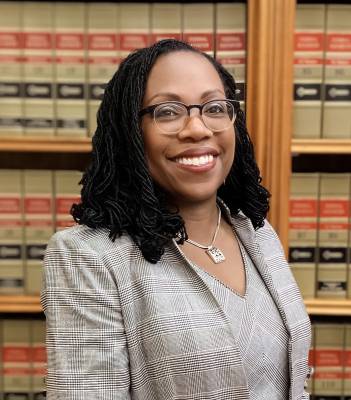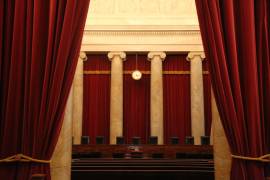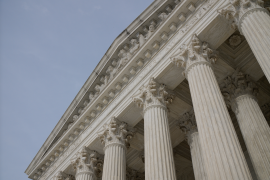
Judge Ketanji Brown Jackson’s Nomination to the Supreme Court is Historic for Representation, But Don’t Stop There
Blog Search
By Kristine A. Kippins, Deputy Legal Director for Policy
In February, when President Biden announced his nomination of Judge Ketanji Brown Jackson to fill the vacancy left by the retirement of Justice Stephen Breyer, he followed through on an important campaign promise to nominate a Black woman to the Supreme Court of the United States. And if Judge Brown Jackson is confirmed by the U.S. Senate, history will be made. She would be the first Black woman and first public defender to sit on the bench of the highest court in the nation.
While a Black woman being nominated to the Supreme Court is long overdue, the power of seeing Judge Jackson break that glass ceiling indicates progress and brings about a sense of pride and optimism for the future, especially for Black Americans, including Black women, Black LGBTQ+ people, and Black people living with HIV. As a Black woman lawyer, I am proud to witness this moment and to be a member of the #SheWillRise Collective dedicated to placing a Black woman on the Supreme Court bench. As a policy professional, I’ve learned from experience that who is in the room making decisions matters, and when decisions are made impacting communities who are not in the room, the outcomes for them are often unhelpful, to say the least. Judge Jackson’s momentous nomination fully embodies the notion that “representation matters,” especially in an institution that has historically and purposefully excluded and disenfranchised Black women from its inception to the current day.
Beyond the aspirational tenor of Jackson’s nomination, it’s also true that our institutions, including the Supreme Court, are stronger when they reflect the great diversity of the United States. We know that the inclusion of different perspectives, histories, and experiences in our judicial system will increase public trust in the institution and enhance judges’ and courts’ decision-making. Judge Jackson’s personal experience as a Black woman in America facing continual bias coupled with her professional history of representing indigent clients in the criminal legal system who face their own set of biases will bring a much-needed perspective to the Court that is currently absent.
Importantly, in the face of unrelenting state legislative attacks on the LGBTQ+ community and people living with HIV, particularly transgender youth, the stakes could not be higher. When combined with the attacks on reproductive rights, voting rights, and nondiscrimination protections more broadly, it’s even more crucial that the law applies fairly and impartially to the communities Lambda Legal serves and that they have equal access to justice.
While we applaud President Biden for understanding the cultural and political significance of Judge Jackson’s nomination, the judicial work is far from finished. The Supreme Court’s importance to our judicial system is impossible to overstate, but we hope that the administration is also prioritizing the lower federal courts so that they too reflect the multitudes of the communities they represent.
Now is the time for President Biden to prioritize repairing the damage done to the entire federal judiciary by former President Trump and former Senate Majority Leader Mitch McConnell, who stacked the courts with conservative white, straight, cisgender men with openly hostile views on LGBTQ+ civil rights, by continuing to confirm professionally and demographically diverse judges to the federal bench. Unfortunately, despite making historic appointments to the federal judiciary during his first year in office, the President fell short in appointing openly LGBTQ+ nominees. The integrity of the courts relies on equal representation, and that absolutely must include LGBTQ+ people as well.
According to a recent Lambda Legal report, while President Biden confirmed more judges in his first year than any president since Ronald Reagan — three-fourths of whom are women and nearly two-thirds of whom are people of color — his administration could have done better improving LGBTQ+ representation in the federal judiciary, with only five nominated judges that openly identify as LGBTQ+ (or 6% of total nominations).
Other key findings from our report on Biden’s first year include:
- As of January 2022, there are only 11 openly lesbian or gay federal district court judges and 3 openly lesbian or gay judges in the federal circuit courts.
- Enormous segments of the country are without any LGBTQ+ representation in the federal judiciary. Specifically, there are five circuits (D.C., First, Fourth, Eighth, and Tenth) covering 22 states, the District of Columbia, American Samoa, and Puerto Rico without a single openly LGBTQ+ judge at any level (district or appellate); 11 additional states also lack an openly LGBTQ+ federal judge.
- There has never been an openly bisexual, transgender, or nonbinary nominee in the history of the judiciary. Only 20 openly gay or lesbian people have ever been nominated to the federal judiciary since the ratification of the Constitution.
- Only 5 of the Biden administration’s 81 nominees are openly gay or lesbian, one of whom already sits on a federal district court. None of them are openly transgender, nonbinary, or bisexual.
As of today, there are 52 current and 32 future vacancies without pending nominations on the district and circuit courts, many of which are in states with at least one Democratic senator who, with a Democratic majority in the Senate and a Democratic president, have an opportunity to put forward qualified openly LGBTQ+ nominees, especially those of color; people living with disabilities; and people with various immigration histories, backgrounds, and professional experiences. Similar to the ways of Judge Jackson’s nomination, LGBTQ+ judicial nominations have major significance too, and not because that means having outcomes that rule in the community’s favor. Meaningful diversification helps ensure all who walk through courthouse doors will be treated with dignity and an array of voices are able to participate in the development of the law.
As we embark on the beginning of Judge Jackson’s Senate confirmation, we should celebrate what her nomination means for Black Americans, especially for Black women and all marginalized communities who yearn to see themselves in our institutions but this should just be the beginning. We need and deserve more of this now, and in the future.




